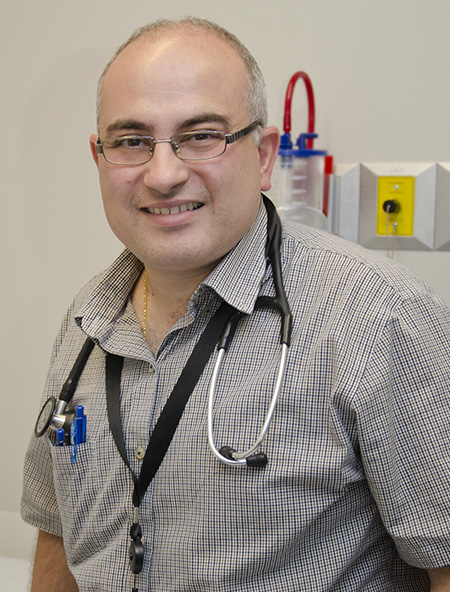Mutual trust and close follow-up, keys to successful hepatitis B treatment
A trusting doctor-patient relationship is important to help patients make well informed decisions about their treatment. When it comes to hepatitis B – a disease requiring long-term treatment and close follow-up – that’s indispensable. Mary*, a McGill University Health Centre (MUHC) patient living with hepatitis B, shares her story.
Mary, who is of Asian descent, was completely taken aback when she found out she had hepatitis B more than a decade ago. Like many people with this common chronic viral disease, she had no symptoms and only got tested because her mother’s doctor recommended it.
“My mother is a diabetic and has regular medical care. In the early 2000’s, her doctor told her that a high percentage of Asians are hepatitis B carriers and he advised her to be tested. When her results came back positive, the whole family had a blood test. My father and my brother didn’t have the virus, but I had acquired it at birth.”
Leading a busy life and in the absence of symptoms, delayed seeking medical care for many years. In 2005, she finally decided to “make the time” to see a liver specialist. She was referred to Hepatologist Dr. Peter Ghali, Program Director for Hepatology and Liver Transplantation at the MUHC and Associate Professor in the Division of Gastroenterology and Hepatology at McGill University.
“Dr. Ghali explained it to me from A to Z and told me if I had a partner, he would have to be vaccinated,” she says. “ And obviously, because it’s contagious through the blood and bodily fluids, I’d have to be a little more careful.”

“Long-term follow-up is essential for people with hepatitis B,” says Dr. Ghali. “This is a ‘silent’ disease, so patients may have no symptoms until they develop severe complications such as cirrhosis, liver failure or liver cancer,” he explains. “Hep B isn’t curable, but it’s treatable, and the risk of transmission can be reduced to almost zero. With good medical care, most patients will live a normal life.”
After a long period of hesitation and many appointments with Dr. Ghali, Mary came to the conclusion that it was time to start taking daily oral medication to control her disease. According to Dr. Ghali, a “completely open and trusting doctor-patient relationship” is the only way to help hepatitis B patients make well informed decisions about their treatment.
“Hep B can be a challenge because there are no symptoms and treatment seems so simple, that over time, many patients feel that maybe they don’t need the medication anymore,” he says. “When they trust me and share those thoughts with me, I can help them understand that stopping the treatment prematurely can actually be much more dangerous than taking medication in the first place.”
Mary, who sees Dr. Ghali every six months to make sure her disease is under control, believes the open and frank relationship she developed throughout the years with her doctor definitely made living with hepatitis B easier.
“I admire Dr. Ghali’s enthusiastic dedication to his work,” she says, “and I’m grateful to be under his professional care.”
*The name was changed to protect the anonymity of the patient.
The MUHC Hepatology clinic: high quality care for patients with hep B and other liver diseases
Chronic hepatitis B is one of the most common viral infections around the world. According to the World Health Organization, an estimated 240 million people live with the disease worldwide and approximately 780,000 people die from it every year. In Canada, hepatitis B is fairly common in immigrant populations from endemic regions such as countries in Asia and Africa.
According to Hepatologist Dr. Peter Ghali, program director for Hepatology and Liver Transplantation at the McGill University Health Centre (MUHC), a non-judgemental attitude is essential when communicating with patients with liver diseases.
“There is still stigma associated with liver disease,” he says “Many people are embarrassed to tell their family, friends and colleagues, or sometimes even their physicians, because they don’t want to be labelled as alcoholics or drug users. In reality, a vast majority of the patients I see are neither of those. Still, the fact is that all patients need to be treated. This is a disease like any other.”
Although the disease is not curable, most people with hepatitis B can live a normal life, provided they are closely followed. The MUHC Hepatology clinic, located at the Glen site, as well as the Chronic Viral Illnesses Service, which will soon be joining the Glen site, serve patients with hepatitis B, C and other kinds of liver disease.
“Our services vary from the relatively simple, like access to a hepatologist, to the more complex such as nursing support for patients with advanced liver disease. These patients also receive care from a multidisciplinary team: a hepatologist, a liver surgeon, a radiologist, a psychiatrist, a dietitian and a social worker. For patients who need transplantation, we provide pre-transplant and post-transplant services. Furthermore, the FibroScan – a fast, painless and low-cost device used to diagnose liver fibrosis and hepatic steatosis, also known as fatty liver disease – allows us to tell our patients how their illness is progressing. This has revolutionized the care we provide at the clinic.”
